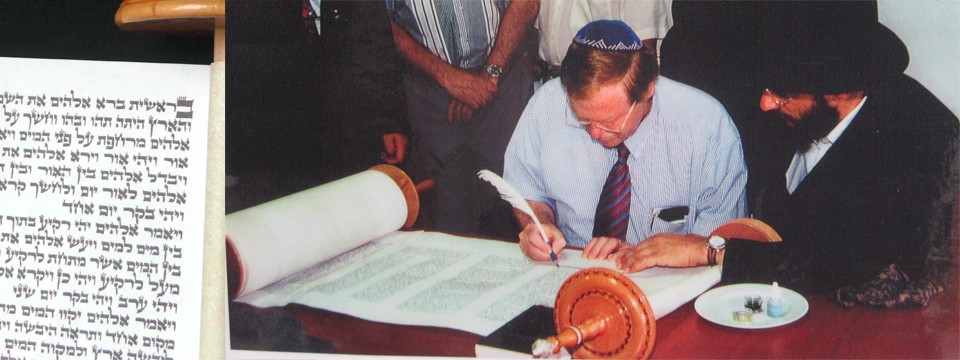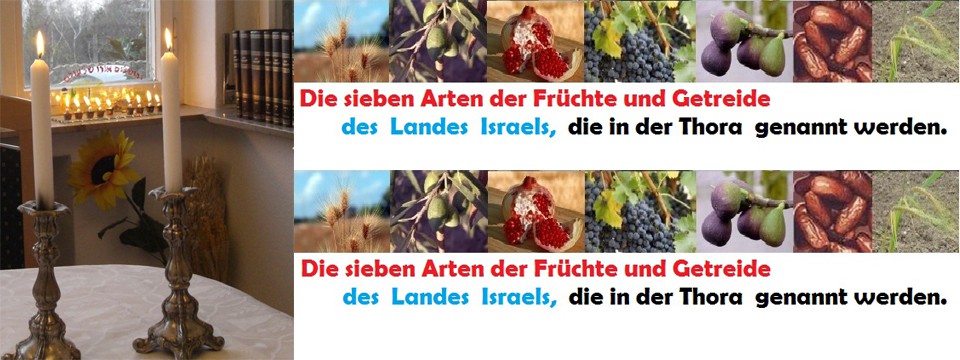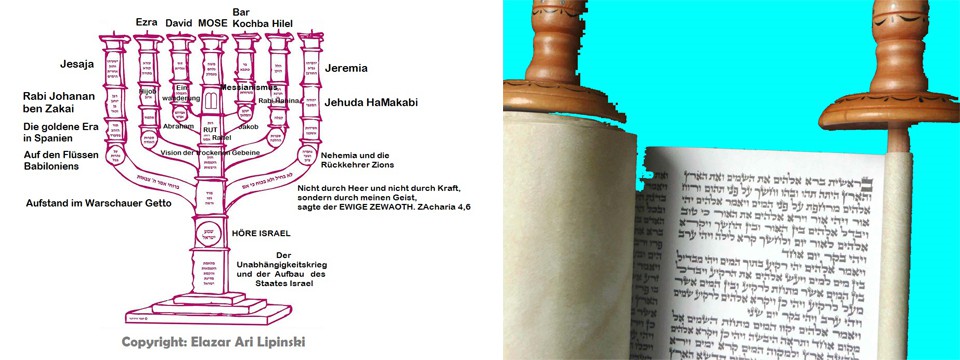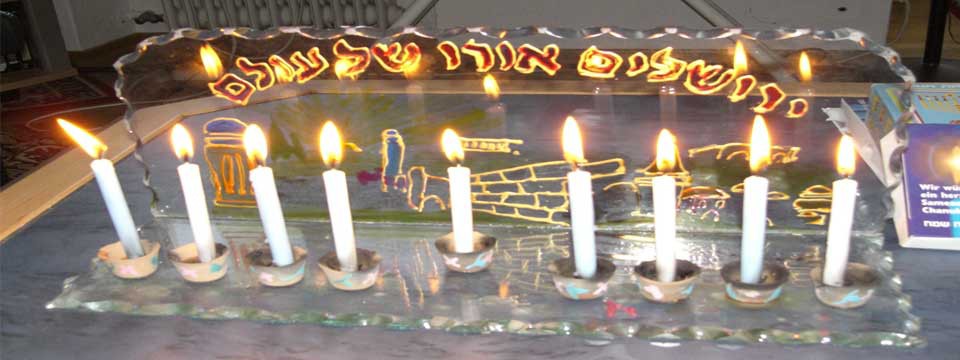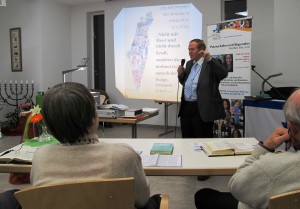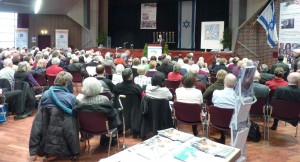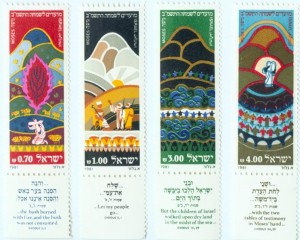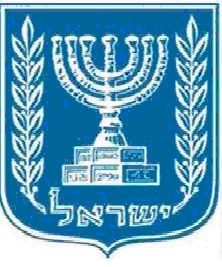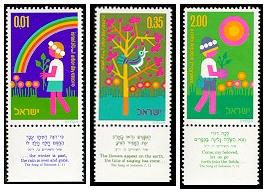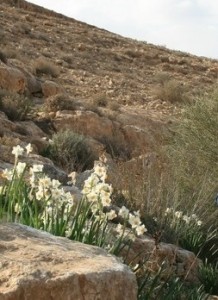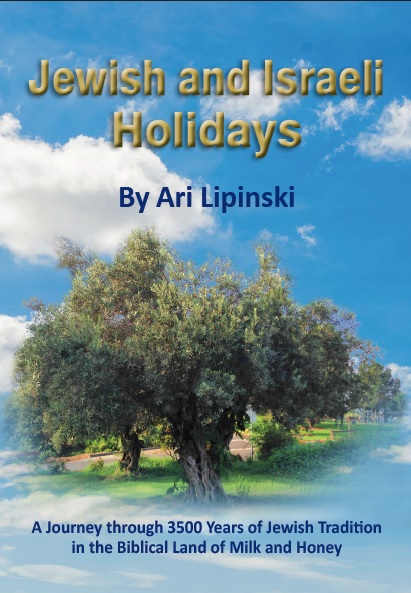BIBLE LECTURES by Ari Lipinski – TORAH Special Commentaries
בס”ד
Ordering a lecture and further detailed subjects you may receive per email: See contact form at page bottom or: Tel. IL: +972-54-7875745 Email: lipinskiari@gmail.com / he.arilipinski.com
In the Bible & Torah Lectures by Ari Lipinski the original Hebrew Torah text is explained in English (or German) according to special Hebrew commentaries of famous Rabbis (but of commentary books mostly not yet translated). New enriching insights are offered by comparing the original Hebrew text with various translations. Using colorful illustrations, pictures of Israel, maps and humor the stroll through Bible stories offers serious contemplation and fun as well. The lectures relate to the weekly Torah Portions (Parashat HaShavuah) and to relevant Jewish Holidays which take place close to the lecture date. Ari Lipinski specializes in adding uptodate scientific and political context to the study of the ancient stories. He shows the Bible is a most modern book.
Some topics are quotes from Ari Lipinski publications and are covered by copyright ©. The user of this website recognizes this copyright by using the site.
The above pictures were taken at a Bible-Seminar in the Maisenbach Bible center in the Black Forest in Germany and at an Israel-Day organized by Ari Lipinski in the Main Hall of the German city Korntal in März 2011. On both occasions Ari Lipinski lectured about unique Hebrew Bible Commentaries.
The original Hebrew Bible text is so strictly preserved from generation to generation in the past 3.300 years that the Hebrew text has only one version. Especially when a Torah scroll is written by a special authorized Rabbi the text is reexamined by other Rabbis to verify that not even a single letter is missing or written wrongly. In contradiction to the one and only Hebrew version the Torah and the Bible translations to other languages differ often substantially from each other. Therefore Ari Lipinski specializes in explaining in up to date English (or if required, in German) the Hebrew original text with a special focus on unique Hebrew Bible commentaries of famous major Rabbis. Ari offers his audience special insights based on commentaries from books which are not yet translated and are practically available only in Hebrew. Often the same Hebrew words and idioms have quite different meanings depending on the context. In his Torah lectures Ari Lipinski offers the audience a rich variety of interpretation nuances thus providing new tools for a broader understanding of the ancient texts which are familiar to the audience. One can enjoy a broader and sometimes deeper perspective of known biblical stories. One may discover interpretation roots for serious misunderstandings and even for resulted prejudices.
Let me give some examples:
TU BiSHVAT – Abravanel Torah Comment – Article Ari Lipinski 2-2015
The angle blesses Jacob with the name Israel: Genesis 32, 29.
כט וַיֹּאמֶר, לֹא יַעֲקֹב יֵאָמֵר עוֹד שִׁמְךָ–כִּי, אִם-יִשְׂרָאֵל: כִּי-שָׂרִיתָ עִם-אֱלֹהִים וְעִם-אֲנָשִׁים, וַתּוּכָל.
The marked words are pronounced as “Ki sarita im elohim ve-anashim, ve-yacholta“
Actually the angle said that Jacob had been close (sarita means you were in the vicinity of) of God (by being close to the angle, and by being back in the Holy Land after crossing the river Yabok) and with people and managed could endure (ve-yacholta), to withstand both. There is no mention in Hebrew of a fight or a struggle but of “being in the vicinity of“. The correct understanding is underlined by Jacob calling the place after this miraculous meeting with the angle “Pniel“. Since there he faced the angle of God. The place was later within the area granted to the tribe of Gad, thus included in what is called the Holy Land.
The German Luther translation of Genesis 32, verse 29 is problematic: “Er sprach: Du sollst nicht mehr Jakob heißen, sondern Israel; denn du hast mit Gott und mit Menschen gekämpft und bist obgelegen.”
Here Luther wrongly said of Jacob as if he had fought (“gekämpft”) with God and humans and won (“bist obgelegen”). Luther’s wrong translation led generations to associate in the German language that the name of Israel has something to do with a fight. In German it even resulted that that the name Israel was commonly wrongly translated as “God’s fighter”, implying a wrong similarity of Jacob to medieval knights. The actual positive idea of the angle praising Jacob for being capable of being close with a higher spirit (the angle) as well as close with his fellow humans, was completely lost in the Luther translation. The resulting cultural impact was that there remained a negative struggle association with the word Israel instead of positively implying the characteristic of being human and simultaneously spiritually aspiring to be near to God. Jacob had just crossed the Yabok river and thus just had been back into the Holy Land, implying that there he was closer to God, by fulfilling His will of settling in the Land God sent already Abraham to.
The King James translation: “28 And he said, Thy name shall be called no more Jacob, but Israel: for as a prince hast thou power with God and with men, and hast prevailed.”
ASV (American Standard Version) “28 And he said, Thy name shall be called no more Jacob, but Israel: for thou hast striven with God and with men, and hast prevailed.”
We see from this interesting example that a correct understanding of the biblical text has an enormous political meaning for understanding the present cultural and political discussions in the modern State of Israel. Only when one properly understands the name “Israel”, one can understand why David Ben Gurion chose this biblical name for the modern state in the proclamation of the State of Israel on May 14th, 1948. He could have given it other names. But “Israel” is not just a name. It is a job description! It is a highly political concept. This state should according to David Ben Gurion strive to justify the biblical blessing. Therefore Ben Gurion deliberately referred to the biblical prophets in the Declaration of Independence.
Bible – Parashat BeShalach – Ari Lipinski Comment 31.1.2015
Remark: Currently Ari Lipinski is preparing a book with a collection of the above mentioned special Bible Hebrew commentaries for the English speaking audience. The book is structured according to the weekly portions (Parashat HaShavuah) of the Torah reading, and according to the division of the five books of the Torah: Genesis, Exodus, Leviticus, Numeri and Deuteronomy. Especial additional focus in this book are the descriptions and illustrations of how the Biblical Holidays are celebrated today.
If you may be interested in supporting and or contributing to the making of this valuable project, please contact Ari Lipinski directly via the email lipinskiari@gmail.com. The Bible commentary project is open for charitable cooperations. In such a frame work a coordinated proportion of the book project income could be devoted to charitable projects for needy children and students or for Shoa (Holocaust) survivors in Israel.
Israel mobile: +972-547875745 or DE mobile: +49-172 7161 894.
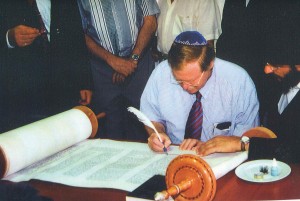 In 2003 Ari Lipinski was honored with writing a few letters (of course in Hebrew) in a newly innaugurated Torah scroll in the Synagogue of the city of Ulm, Germany. When a new Torah Scroll is innougurated, sometimes the last words are written publicly under the supervision of the Rabbi who wrote the whole scroll. In this case the Israeli born Rabbi Shneur Trebnik (sitting near Ari Lipinski) headed the ceremony as the Rabbi of Ulm.
In 2003 Ari Lipinski was honored with writing a few letters (of course in Hebrew) in a newly innaugurated Torah scroll in the Synagogue of the city of Ulm, Germany. When a new Torah Scroll is innougurated, sometimes the last words are written publicly under the supervision of the Rabbi who wrote the whole scroll. In this case the Israeli born Rabbi Shneur Trebnik (sitting near Ari Lipinski) headed the ceremony as the Rabbi of Ulm.
Following is a list of optional topics for Bible lectures which Ari Lipinski offers to hold in English (or German or Hebrew). Often inviting audiences prefer the topic to be related to the current Weekly Portion of the Torah (and maybe even referring to a Jewish Holiday which takes place in the specific month of the lecture date) :
Lecture topic examples: Before listing some optional topics we may remember a helpful guideline for the Bible reading. Most of us read many chapters of the Bible stories as school kids. Of course, when we read again the same texts in a later age our perception and the current context attribute to the same old story a new light. If we then read the Bible sentences a bit slower then the usual speed and try to verify the meaning of each word we may come up with additional surprising understandings. When we add to that the wise and deeper insights of some of the major Bible commentators the picture becomes more colorful and our reading is enriched and invites us for further contemplation on our own.
Therefore Bible reading groups, house circles and various community gatherings offer the Ari Lipinski Bible lectures a few times a year to stimulate and reenvigorate the ordinary meetings and Bible studies which take place throughout the year anyhow.
So here are some topic examples for Bible lectures and or Bible lecture series by Ari Lipinski:
- The Bible Story of The Creation – some puzzles of the original Hebrew text
The Bible begins in English with the words “In the Beginning”. These three words stand for the single Hebrew word in the original version: “Bereshit” בראשית. The Hebrew word consists of six letters.
What far reaching messages are hidden in the Hebrew spelling of the first word of the Bible?
Why does the Hebrew Bible begin with the second letter of the Hebrew alphabet Bet ב?
- The 70 Hebrew Names of God in the Bible
What are the 70 Hebrew Biblical names attributed to God?
What is the “Gimatria” about?
- What is the actual content of the “Ten Commandments”?
How many commandments are actually expressed in the so called “10 Commandments”?
How many times were the “10 Commandments” given?
What is the Hebrew name of the “10 Commandments”?
Why did the LORD give the “10 Commandments” in the Sinai desert and not in Jerusalem?
Extra sub topic: A comparative reading of the “10 Commandments” as they are formulated once in the book of Exodus, chap. 20 and later in the book of Deuteronomy, chap. 5.
- Biblical Prophetic Promises and their Modern Implementation in Israel Today
This topic can be presented focusing on a specific prophet according to the choice of the inviting audience.
When did the Prophet X live?
How did Jerusalem or the land of Israel look like at the time of the prophet compared with Israel today?
In this lecture the Bible text of the visions is compared with up to date pictures from Israel.
- The Meaning of the Hebrew Names of the Books of the Bible
Do you actually know the meaning of the names of the biblical figures such as for example Israel, Isaiah, Jeremiah, Ezekiel, Samuel, Zechariah or Malachi?
Does the word Palestine appear in the Bible?
What is the meaning in the Bible of the area called “Pleshet” פלשת during the Abraham and Isaac times?
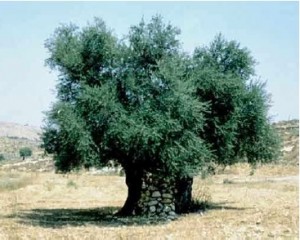 About the Tree in the Bible / From the Biblical Tree to Modern Aforestation in Israel today ©
About the Tree in the Bible / From the Biblical Tree to Modern Aforestation in Israel today ©
What is the symbolic meaning encripted in the Hebrew spelling of the names of the trees appearing in the Bible?
What is the exact translation of Hebrew biblical names of trees, not according to the English botanic names known for these species?
(The word by word translation from Hebrew provides a different insight into the biblical context.)
- The Olive Tree Which messages are conveyed in the Bible by the symbol of the Olive Tree?
- Water in the Bible: From Biblical Water Prophesies to Innovative Water High Tech in Israel of Today.
- Lecture series: Biblical Prophets (Choice at the discretion of the inviting audience.)
- Why was Moses not allowed to enter himself the Promised Land?
A comparative investigation into the ‘pros and contras’ for the various optional answers to the question.
[contact-form-7 id=”1534″ title=”Kontaktformular 1″]






